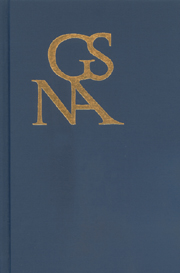Book contents
- Frontmatter
- Contents
- Presidential Address (December, 2004) Schiller vs. Goethe: Revisiting the Conflicting Reception Vectors of Heinrich Heine, Ludwig Börne, and Wolfgang Menzel
- Goethe's Mixed Media: The Entertainers in Jahrmarktsfest zu Plundersweilern
- Goethe's “Ilmenau” and the Origins of the Aesthetic State
- Familial Politics and Political Families: Consent, Critique, and the Fraternal Social Contract in Schiller's Die Räuber
- Paintings in Goethe's Wilhelm Meister Novels: The Dynamics of Erecting and “Eroding” the Paternal Law
- “Waldplatz,” “Wahlplatz”: Miszelle zur Golgatha-Konnotation einer Episode in Wilhelm Meisters Lehrjahre
- Shocks from a Sicilian Underworld: Gangi,“Gänge,” and a New Source for the “Mütter” in Goethe's Faust
- “Feuer brennen blau”: Rethinking the Rainbow in Goethe's Faust
- Cosmopolitanism and Weltliteratur
- “Von jedem öffentlichen Wirken in Deutschland ausgeschloßen”: Ein Brief Ottilie von Goethes an Sarah Austin (4. Aug. 1840)
- Book Reviews
“Waldplatz,” “Wahlplatz”: Miszelle zur Golgatha-Konnotation einer Episode in Wilhelm Meisters Lehrjahre
Published online by Cambridge University Press: 05 February 2013
- Frontmatter
- Contents
- Presidential Address (December, 2004) Schiller vs. Goethe: Revisiting the Conflicting Reception Vectors of Heinrich Heine, Ludwig Börne, and Wolfgang Menzel
- Goethe's Mixed Media: The Entertainers in Jahrmarktsfest zu Plundersweilern
- Goethe's “Ilmenau” and the Origins of the Aesthetic State
- Familial Politics and Political Families: Consent, Critique, and the Fraternal Social Contract in Schiller's Die Räuber
- Paintings in Goethe's Wilhelm Meister Novels: The Dynamics of Erecting and “Eroding” the Paternal Law
- “Waldplatz,” “Wahlplatz”: Miszelle zur Golgatha-Konnotation einer Episode in Wilhelm Meisters Lehrjahre
- Shocks from a Sicilian Underworld: Gangi,“Gänge,” and a New Source for the “Mütter” in Goethe's Faust
- “Feuer brennen blau”: Rethinking the Rainbow in Goethe's Faust
- Cosmopolitanism and Weltliteratur
- “Von jedem öffentlichen Wirken in Deutschland ausgeschloßen”: Ein Brief Ottilie von Goethes an Sarah Austin (4. Aug. 1840)
- Book Reviews
Summary
VERSCHIEDENTLICH IST DIE HYPOTHESE aufgestellt worden, in der Gestalt Wilhelm Meisters ließen sich Christus-Konnotationen finden. (Allerdings ist diese Hypothese auch auf heftigen Widerspruch gestoßen.) Ein Grund dafür, daß diese Konnotationen über lange Zeit nicht deutlicher sichtbar gewesen sind, liegt in einem Versehen, das der Hamburger Ausgabe (HA) an drei Stellen unterläuft. Es besteht darin, daß die Schreibung “Wahlplatz,” wie sie von der Weimariana tradiert worden ist, durch die Lesart “Waldplatz” ersetzt wird (226,38, 227,16 und 238,2).Zwar ist dieses Versehen von der Münchner (MA) sowie von der Frankfurter Ausgabe (FA) mittlerweile berichtigt worden; doch es lohnt sich, dem Fehler und seinen Ursprüngen nachzuspüren.
Die HA hält sich im Prinzip zwar an den Text der Weimariana, aber die genannte Abweichung wird nicht—wie in anderen Fällen—im Abschnitt “Zur Textgestalt”(806–9) aufgeführt. Ich gehe dagegen von der Hypothese aus, daß Goethe wohlüberlegt an den drei Stellen die Schreibweise “Wahlplatz” verwendet hat. Das Ziel meiner Argumentation sei kurz angedeutet, bevor sie dann schrittweise entwickelt wird. Der Ausdruck “Wahlplatz”oder—so die MA—“Walplatz”geht auf den Ausdruck “Walstatt” zurück, und dieser führt u.a. die Bedeutung “Golgatha” mit sich. Ich will mit einigen ausgewählten Hinweisen plausibel machen, daß die Lesart der MA und der FA den Intentionen Goethes entspricht.
Herausgeber und Redakteur der “Theatralischen Sendung”im Rahmen der Weimariana, Harry Maync und und Julius Wahle, bestätigen, daß sämtliche Drucke der “Lehrjahre” “Wahlplatz” schreiben (WA 1.52:296) und stützen somit den Wortlaut der Ausgabe der “Lehrjahre” in der WA.
- Type
- Chapter
- Information
- Goethe Yearbook 13 , pp. 125 - 130Publisher: Boydell & BrewerPrint publication year: 2005



